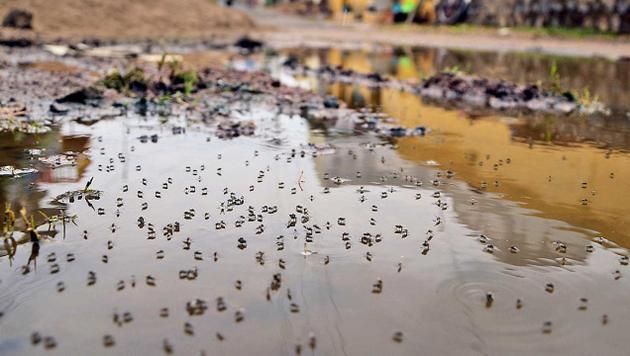With mosquito season right around the corner and a cure for the Zika virus a decade away, by expert estimates, local governments across the United States are devising mosquito control strategies. Predictably, many of these strategies incorporate the publicization of information regarding Zika transmission and symptoms as well as the spraying of wetlands and fields with insecticide. However, a growing number are aimed at an unlikely target: vacant and abandoned properties. This piece discusses the link between property blight and mosquito-borne pandemic with the hope that more Mosquito Control divisions will take the connection into consideration when addressing Zika’s inevitable resurgence this summer.
Two Intertwined Issues
Pools of stagnant water make the ideal breeding ground for vector mosquitoes—a fact that Mosquito Control officials urge homeowners to keep in mind when performing property maintenance. Government can rely on responsible homeowners to chlorinate their swimming pools and dump the rainwater that collects on the lids of outdoor garbage cans, but what about the stagnant water on properties without a known and/or responsible owner?

Pools of stagnant water make the ideal breeding ground for vector mosquitoes.
Last summer, Woodbridge, New Jersey answered this question by demolishing an above ground swimming pool at one of its 100+ vacant properties. Woodbridge decided to demolish the pool after receiving daily telephone calls from a neighboring resident concerned that the mosquitoes it drew carried the Zika virus. Thirty-five additional above and in-ground swimming pools were slated for demolition.
Their tendency to host neglected pools of stagnant water is just one reason vacant properties are a major concern for health officials working to suppress the spread of Zika. In June, USA Today ran a front-page story entitled, “Hardest-Hit Zika Victims Could Be People in Poverty”. The article describes the swarms of mosquitoes that thrive in New Orleans, Louisiana’s 9th Ward district—abandoned since Hurricane Katrina. The heaps of garbage, collapsed walls and lack of cooling systems have created an optimal breeding ground. Peter Hotez, dean of the National School of Tropical Medicine at Baylor College in Houston, Texas explains that these conditions make residents in surrounding properties more susceptible to contracting the Zika virus. He warns that, “Americans who live in neglected neighborhoods could face the greatest danger.”
With summer weather fast approaching, the nation’s vector abatement professionals are preparing for Zika’s reemergence. Whereas traditional mosquito control methods should not be overlooked, neither should the correlation between the volume and condition of vacant and abandoned properties and the risk of Zika’s transmission.
GovPilot: The Dual Solution
GovPilot’s namesake management platform supports local government in the abatement of vector mosquitoes as well as the management of vacant and abandoned properties.
Digital forms carry complaints about mosquitoes and concerns surrounding vacant and abandoned properties to the Mosquito Control and Code Enforcement departments, respectively.Form data resides in GovPilot’s secure, web-based server, where members of both departments can easily access it and work together to take on this double threat.
Data sets come to life on GovPilot’s geographic information system (GIS) map. Custom, color-coded map layers depict the locations of property abandonment and mosquito infestation to facilitate the identification and analysis of trends.
GovPilot is the only management platform robust enough to help local government tackle the compound problem of property blight and Zika. Now is the time to explore this option.





